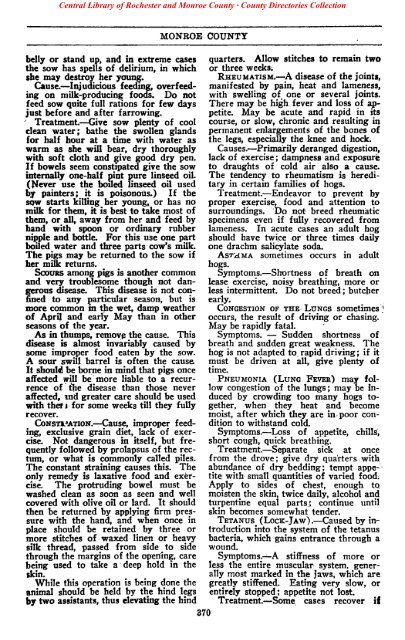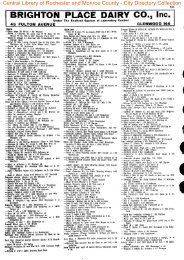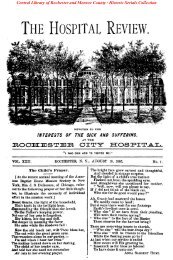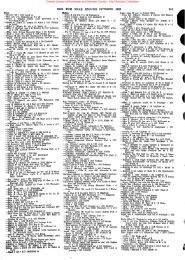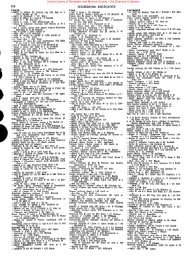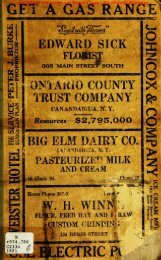The Farm Journal Illustrated Rural Directory of Monroe County, New ...
The Farm Journal Illustrated Rural Directory of Monroe County, New ...
The Farm Journal Illustrated Rural Directory of Monroe County, New ...
Create successful ePaper yourself
Turn your PDF publications into a flip-book with our unique Google optimized e-Paper software.
Central Library <strong>of</strong> Rochester and <strong>Monroe</strong> <strong>County</strong> · <strong>County</strong> Directories Collection<br />
MONROE COUNTY<br />
belly or stand up, and in extreme cases<br />
the sow has spells <strong>of</strong> delirium, in which<br />
she may destroy her young.<br />
Cause.—Injudicious feeding, overfeeding<br />
on milk-producing foods. Do not<br />
feed sow quite full rations for few days<br />
just before and after farrowing.<br />
' Treatment—Give sow plenty <strong>of</strong> cool<br />
clean water; bathe the swollen glands<br />
for half hour at a time with water as<br />
warm as she will bear, dry thoroughly<br />
with s<strong>of</strong>t cloth and give good dry pen.<br />
If bowels seem constipated give the sow<br />
internally one-half pint pure linseed oil.<br />
(Never use the boiled linseed oil used<br />
by painters; it is poisonous.) If the<br />
sow starts killing her young, or has no<br />
mule for them, it is best to take most <strong>of</strong><br />
them, or all, away from her and feed by<br />
hand with spoon or ordinary rubber<br />
nipple and bottle. For this use one part<br />
boiled water and three parts cow's milk.<br />
<strong>The</strong> pigs may be returned to the sow if<br />
her milk returns.<br />
SCOURS among pigs is another common<br />
and very troublesome though not dangerous<br />
disease. This disease is not confined<br />
to any particular season, but is<br />
more common in the wet, damp weather<br />
<strong>of</strong> April and early May than in other<br />
seasons <strong>of</strong> the year.<br />
As in thumps, remove the cause. This<br />
disease is almost invariably caused by<br />
some improper food eaten by the sow.<br />
A sour swill barrel is <strong>of</strong>ten the cause<br />
It should be borne in mind that pigs once<br />
affected will be more liable to a recurrence<br />
<strong>of</strong> the disease than those never<br />
affected, ?nd greater care should be used<br />
with thef i for some weeks till they fully<br />
recover.<br />
CONSTIPATION.—Cause, improper feeding,<br />
exclusive grain diet, lack <strong>of</strong> exercise.<br />
Not dangerous in itself, but frequently<br />
followed by prolapsus <strong>of</strong> the rectum,<br />
or what is commonly called piles.<br />
<strong>The</strong> constant straining causes this. <strong>The</strong><br />
only remedy is laxative food and exercise.<br />
<strong>The</strong> protruding bowel must be<br />
washed clean as soon as seen and well<br />
covered with olive oil or lard. It should<br />
then be returned by applying firm pressure<br />
with the hand, and when once in<br />
place should be retained by three or<br />
more stitches <strong>of</strong> waxed linen or heavy<br />
silk thread, passed from side to side<br />
through the margins <strong>of</strong> the opening, care<br />
being used to take a deep hold in the<br />
skin.<br />
While this operation is being done the<br />
animal should be held by the hind legs<br />
by two assistants, thus elevating the hind<br />
quarters. Allow stitches to remain two<br />
or three weeks;<br />
RHEUMATISM.—A disease <strong>of</strong> the joints,<br />
manifested by pain, heat and lameness,<br />
with swelling <strong>of</strong>. one or several joints.<br />
<strong>The</strong>re may be high fever and loss <strong>of</strong> appetite.<br />
May be acute and rapid in its<br />
course, or slow, chronic and resulting in<br />
permanent enlargements <strong>of</strong> the bones <strong>of</strong><br />
the legs, especially the knee and hock.<br />
Causes.—Primarily deranged digestion,<br />
lack <strong>of</strong> exercise; dampness and exposure<br />
to draughts <strong>of</strong> cold air also a cause.<br />
<strong>The</strong> tendency to rheumatism is hereditary<br />
in certain families <strong>of</strong> hogs.<br />
Treatment.—Endeavor to prevent by<br />
proper exercise, food and attention to<br />
surroundings. Do not breed rheumatic<br />
specimens even if fully recovered from<br />
lameness. In acute cases an adult hog<br />
should have twice or three times daily<br />
one drachm salicylate soda.<br />
ASTHMA sometimes occurs in adult<br />
hogs.<br />
Symptoms.—Shortness <strong>of</strong> breath on<br />
lease exercise, noisy breathing, more or<br />
less intermittent. Do not breed; butcher<br />
early.<br />
CONGESTION OF THE LUNGS sometimes '<br />
occurs, the result <strong>of</strong> driving or chasing.<br />
May be rapidly fatal.<br />
Symptoms. — Sudden shortness <strong>of</strong><br />
breath and sudden great weakness. <strong>The</strong><br />
hog is not adapted to rapid driving; if it<br />
must be driven at all, give plenty <strong>of</strong><br />
time.<br />
PNEUMONIA (LUNG FEVER) may follow<br />
congestion <strong>of</strong> the lungs; may be Induced<br />
by crowding too many hogs together,<br />
when they heat and become<br />
moist, after which they are in poor condition<br />
to withstand cold.<br />
Symptoms.—Loss <strong>of</strong> appetite, chills,<br />
short cough, quick breathing.<br />
Treatment.—Separate sick at once<br />
from the drove; give dry quarters with<br />
abundance <strong>of</strong> dry bedding; tempt appetite<br />
with small quantities <strong>of</strong> varied food.<br />
Apply to sides <strong>of</strong> chest, enough tq<br />
moisten the skin, twice daily, alcohol and<br />
turpentine equal parts; continue until<br />
skin becomes somewhat tender.<br />
TETANUS^ (LOCK-JAW).—Caused by introduction<br />
into the system <strong>of</strong> the tetanus<br />
bacteria, which gains entrance through a<br />
wound.<br />
Symptoms.—A stiffness <strong>of</strong> more or<br />
less the entire muscular system, generally<br />
most marked in the jaws, which are<br />
greatly stiffened. Eating very slow, or<br />
entirely stopped; appetite not lost.<br />
Treatment.—Some cases recover if<br />
370


